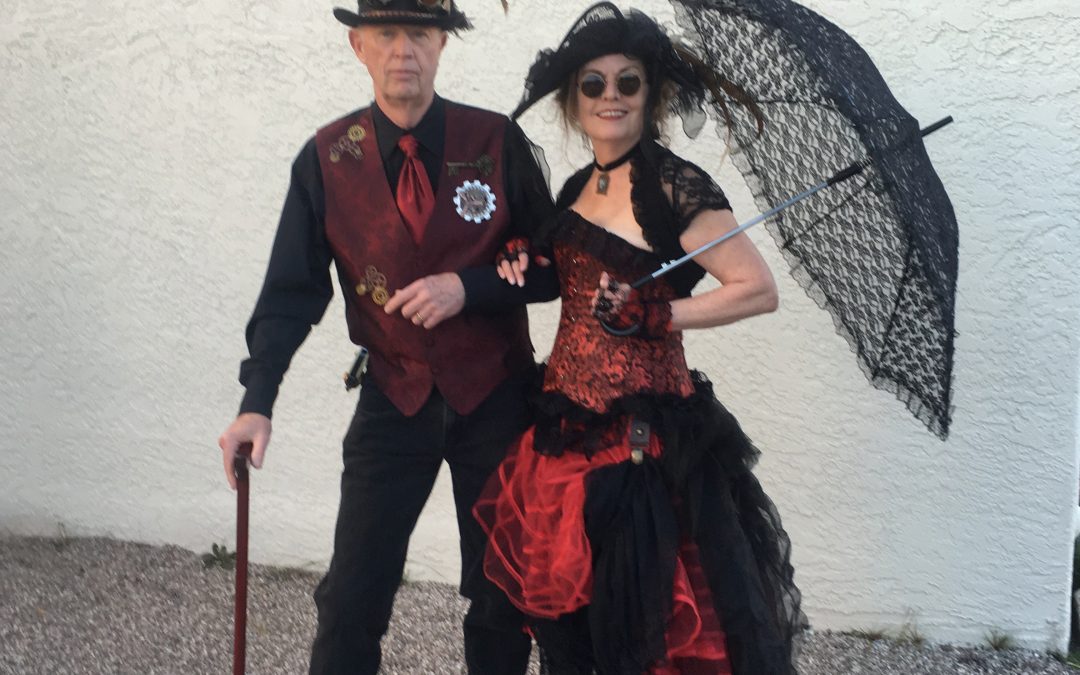The photo is of Ed and me nearly 20 years ago.
Drama or action movie? Chinese or Italian food? Spending or saving the latest paycheck?
Sacrifice in a partnership means that I freely choose to give up something I want for the sake of another.
And sometimes we’re asked to give up something that’s a lot more significant than which movie to watch. For example, my husband Ed and I are retired and are currently discussing which part of the U.S. we might want to live in during this phase of life when jobs no longer dictate where we go. He chooses the southeast; I choose the northwest. You can’t really get much farther apart within the same country!
Who sacrifices?
I believe most of us know that if we let go of the need to always have things our way, our relationship will provide a much deeper level of fulfillment than it does when we are using it to satisfy our own personal selfish desires.
So I’ll begin with that as a premise: Sacrifice is a given in successful long-term intimate relationships.
I think the more challenging questions have to do with the motivations for sacrificing. We engage in acts of sacrifice for many different reasons, and some are healthier than others.
Quid Pro Quo
I’ll scratch Ed’s back if he scratches mine.
One problem with this quite logical transactional approach is that our lives are rarely in a perfect 50/50 balance. If the quid pro quo is about household chores, for example, there may be times when Ed is ill, or busier than I with other things. Doing less during these times to match what he’s contributing means we both begin doing less and less. And down the dark spiral we go.
And besides, sometimes a quid pro quo system of exchange is simply irrelevant. “I’ll move to Chattanooga in our retirement if you’ll move to Seattle” is nonsensical if we want to stay together.
While the purpose of sacrificing something for Ed may not be to get something from him in return, it often does have a positive payback. And when I experience sacrifices Ed makes for my benefit, it’s hard not to return the consideration. But a direct quid pro quo system of exchange will likely come back to bite us.
Conflict Avoidance
I was in a long-term partnership many years ago with a man who hated conflict so much that he would often sacrifice what he wanted in order to keep the peace in our relationship.
You’d think this would have been a satisfying relationship for me, the recipient of these sacrifices. It turns out that psychological studies now validate some of my dissatisfaction in that benevolent relationship. A study published in the Journal of Personality and Social Psychology argues that when people believe their partner sacrificed for avoidance-motivated reasons, they feel less satisfied with the relationship.
And the conflict-avoiders usually are left with a war inside themselves that undermines their satisfaction in the relationship as well.
When I sacrifice to make Ed happy, this can potentially increase trust and happiness, but only as long as I don’t do it simply to avoid conflicts between us.
To Be the “Good” Partner No Matter What
We’ve all known them: People who seem to consistently prioritize others’ needs above their own. But the foul underbelly of this apparent goodness often looks more like a hidden form of quid pro quo.
It’s hardly surprising that psychologists have documented that genuine acts of kindness are healthy in an intimate relationship, but using sacrifice as a bargaining chip will likely lead to resentment from the partner.
And of course, those who consistently make their partners’ needs more important than their own often pay a high cost in self-esteem and mental health over the long run.
Ed and I don’t have this particular challenge in our relationship. Neither of us is highly motivated to be the “good” partner no matter what!
So, yes, relationships require sacrifice, but Ed and I shouldn’t give up or give in regarding the issue of where to live out our retired years without carefully considering our underlying motivations. The right kind of sacrifice will bring us together. Sacrificing for the wrong reasons will only tear us apart.
My next blog will explore ways that Ed and I are addressing this issue. We are committed to asking the tough questions that will increase the probability not only of finding the right place for us to live, but also continued growth individually and as a couple.


Marlena says that “sacrifice is a given in successful long-term intimate relationships.” And yet after decades together I don’t feel like our marriage has caused me to experience living in sacrifice. Maybe, as the picture of us above suggests, I’ve just flipped out over her.
I for one am really looking forward to the next blog about our future together!
Ha!
Ed and Marlena: I appreciate your blogs so much – often print them off to keep. And I very seldom comment. But this one really “hit home” for me personally. Howard and I, too, are facing decisions which will affect our future and where we live. I appreciated your thoughts about “consistently prioritizing others’ needs above ones own.” That has been my practice for much of my life. It has its rewards but also its drawbacks. So I’m thinking – – – praying for what direction to go. Thanks, Marlena!
Dear AnnaBeth. Thank you so much for this! It is my deepest desire that we might share struggles and triumphs that are universal, but that we often keep to ourselves – and learn from each other. We are together on this journey.